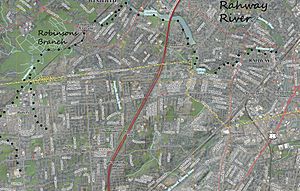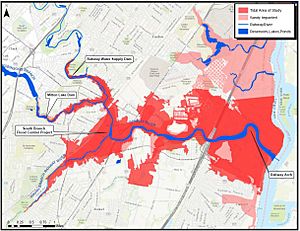Robinsons Branch facts for kids
Robinsons Branch is a small river, also called a tributary, that flows into the Rahway River. It is located in New Jersey, passing through parts of Union and Middlesex Counties. Think of it as a smaller stream that joins a larger river, like a branch on a tree.
Contents
Where Robinsons Branch Begins
The journey of Robinsons Branch starts in several towns. These starting points are called its headwaters. You can find the headwaters in areas of Fanwood, Plainfield, and Edison, New Jersey. This is where the tiny streams that form the river first appear.
The River's Path
As Robinsons Branch flows, it travels through several communities. These include Scotch Plains, Westfield, Clark, and Rahway. Finally, it empties into the main Rahway River. This meeting point is about five miles upstream from a larger waterway called the Arthur Kill.
How Big is Its Area?
The area that collects water for Robinsons Branch is called its drainage area. This area covers about 21.6 square miles. Most of this land is located within Union County. All the rain and runoff from this large area eventually flow into Robinsons Branch.
Lakes and Water Flow
Along its path, the river's flow is controlled in a few places. It is impounded, meaning its water is held back by dams, forming lakes. Two examples are Middlesex Reservoir and Milton Lake. The river is also affected by ocean tides up to the Milton Lake Dam. This means the water level can rise and fall with the tides, just like the ocean.
Understanding Flooding
Flooding can sometimes be a problem along Robinsons Branch. This often happens where it meets another stream called Pumpkin Patch Brook. The area around this meeting point has a lot of buildings and homes. This development can make flooding worse.
Types of Flooding
There are two main types of flooding that can occur here:
- Fluvial flooding: This happens when the river itself overflows its banks. It's usually caused by heavy rainfall that makes the river swell.
- Tidal flooding: This occurs when high ocean tides push water up the river from the Rahway River. This can cause the water level to rise even without heavy rain.
 | Emma Amos |
 | Edward Mitchell Bannister |
 | Larry D. Alexander |
 | Ernie Barnes |



